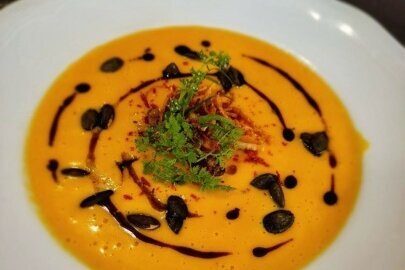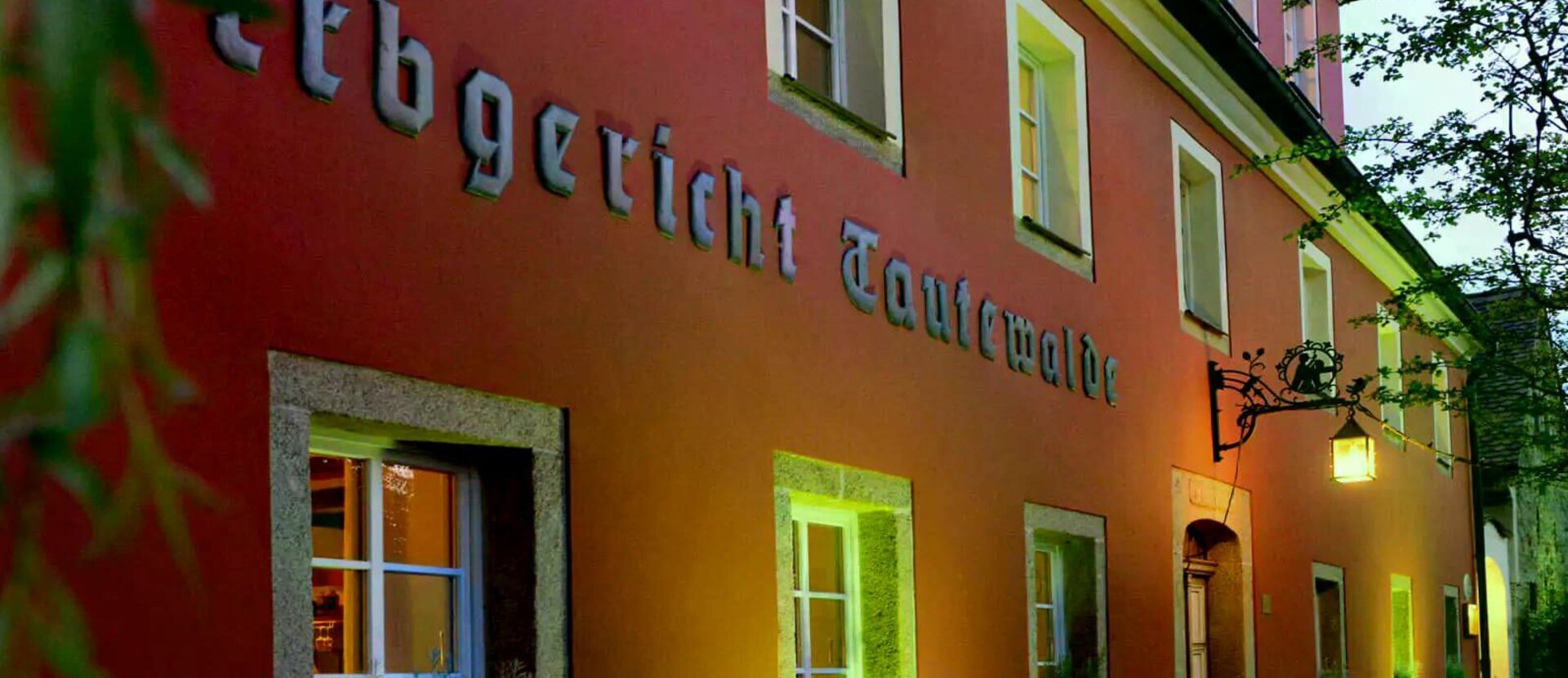
From Upper Lusatia to the wide world and back: Enrico Schulz, trained chef and managing director of the traditional Hotel & Restaurant Erbgericht Tautewalde, has an impressive culinary journey behind him. Having worked in Switzerland, on Norderney and at international catering events for Mercedes-Benz, he brings a wealth of experience to his kitchen. In this interview, he explains how he combines hearty Upper Lusatian cuisine with Mediterranean influences and what particularly inspires him about his homeland.
Mr. Schulz, how did you end up at Erbgericht Tautewalde?
I grew up in Löbau, here in Upper Lusatia. After reunification, I was initially drawn to faraway places - I completed my apprenticeship as a chef in Baden-Württemberg, where I also met my wife. This was followed by 16 years on the road: from northern and southern Germany to Switzerland and stations such as Norderney and catering for Mercedes-Benz. In 2006, chance brought us back to Upper Lusatia. We initially took over the Erbgericht as tenants and were able to purchase it in 2014.
What ultimately made you decide to return?
Above all, it was family planning and the desire to stay close to home. We were in Switzerland at the time. The social security in Germany and the proximity to family played a role. Added to this was the region's tourism potential, which inspired us - a perfect basis for our passion.
When did you discover your passion for cooking?
Cooking has been with me since I was a child. My grandmother was the cook at my nursery, and my mother and aunt were also talented cooks. But becoming a chef was initially a stopgap measure. After reunification, my dream of becoming an agricultural machinery mechanic was shattered and my aunt suggested I become a chef. That turned out to be the best decision. During my years of traveling, I discovered many culinary facets: from fish cuisine on Norderney to Mediterranean influences in Switzerland - each station has shaped my style.
What does Upper Lusatia taste like to you?
Upper Lusatia used to be home cooking for me - jacket potatoes with quark and linseed oil, garlic soup, home-grown vegetables and mushrooms from the forest. Today, Upper Lusatia is much more than that. It has opened up, and regional producers and culinary influences from outside have given the cuisine a whole new variety. For me, the appeal lies in combining traditional dishes such as roulade or brawn with modern, light influences.
What role do regional products play in your cuisine?
A very big one! Our honey comes from the beekeeper in the village and a neighbor grows vegetables especially for us. We get asparagus from the Spreewald and cheese from the Vogtland - for me, home is what counts, and that also includes neighboring regions. It is important that the quality is right and that we work with honest, fresh ingredients.
Do you have a typical dish that your guests particularly love?
Definitely our Oberlausitzer Roulade, filled with sauerkraut - a recipe from an old cookbook that I could never take off the menu. The garlic soup with barley and bacon and our ox cheeks are also very popular with guests. These classics remain, while we adapt the rest of the menu seasonally.
How do you create new dishes for your menu?
It's a collaborative process within the team. We brainstorm what the next season could bring and everyone contributes their ideas. There are classics that we update, but there are also always new dishes that we try out. It's important that the chefs stand behind their creations - only then can the dishes be served with conviction.
What is your vision for the culinary future of Upper Lusatia?
I hope that Upper Lusatia does not forget its roots and remains modern at the same time. Home cooking, honest cuisine and regional products should play a central role. Not everything always has to be available - for me, quality is the priority, not quantity. If guests feel that our staff enjoy working here and that the dishes are prepared with passion, then we have done a lot of things right.
When you're not cooking yourself, where do you like to eat out?
I really appreciate my colleagues in the region. When we're out and about, we like to visit Tina Weßollek, head chef at L'Auberge "Gutshof" restaurant in Bischofswerda, or André Meier at Beckenbergbaude. However, such opportunities are rare. When we have time off, we enjoy spending time with our children, making a fire in the garden and roasting sausages. There's no need for elaborate culinary creations. We like to spend our vacations in Italy. We all love the food there, enjoy the Mediterranean cuisine to the full and come home to Upper Lusatia with new inspiration.
Baked saddle of suckling pig with bacon and cabbage
Preparation
Score the rind on the back of the suckling pig with a knife, then season the back all over. In the meantime, boil down the honey, beer, garlic, a little rosemary and thyme to a syrup. Now place the loin on a baking tray and brush with the beer and honey mixture, add the herbs and cook in the oven at 160°C for approx. 1.5 hours. The back should have a core temperature of approx. 65°C.
Cut the white cabbage into "patches" and dice the shallots. First fry the finely chopped bacon in a pan, then add the white cabbage and shallots and sauté. Season the cabbage, deglaze with a little white wine and vegetable stock and cook until al dente.
Vinschgau cheese dumplings
Preparation
Cut the bread rolls into cubes and pour the warm milk over them, then leave to stand for approx. 30 minutes. Peel the shallot and cut into small cubes. Then sauté the shallot cubes with the chopped parsley in a little butter.
Add this and the eggs to the bread and knead well.
Cut the cheese into cubes. Divide the bread mixture into 100 g balls. Place the mountain cheese in the middle of each dumpling, shape into dumplings and cook in gently simmering water.

